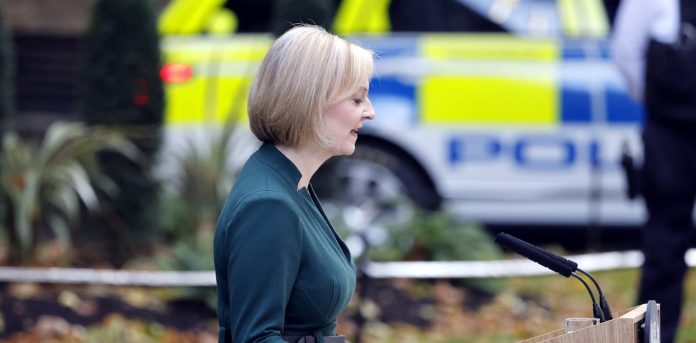Liz Truss’s mini-budget looms large in the election campaign – here’s why it was such a disaster

The words “Liz Truss” and “mini-budget” have become shorthand for financial recklessness and economic chaos. But what was it about the former prime minister’s economic management that was so disastrous?
Truss’s premiership was defined by the mini-budget disaster, where she promised £45 billion of unfunded tax cuts and hoped to unleash runaway growth.
In the UK, the Office for Budget Responsibility (OBR) normally provides the economic forecast on which government taxing and spending plans are based. Before a budget, it works closely with the Treasury and other government departments.
But Truss rebuffed offers of OBR oversight – so none of this happened ahead of her mini-budget. This arguably set the wrecking ball rolling.
The OBR is what’s known as a fiscal council – in other words a spending watchdog aimed at increasing transparency around economic policymaking and protecting public finances.
It was set up in 2010 to provide independent evaluation and oversight of the government’s budgeting choices.
Previously, the Treasury was tasked with economic forecasting, but shifting this to the independent OBR transformed how economic policy was formed. With forecasts no longer line-managed by the chancellor, the scope for wishful thinking, excess optimism and political manipulation was eliminated.
The OBR was designed to strengthen UK economic credibility and reassure financial markets, but it is not a policymaking body. Rather, it assesses whether government economic policies are likely to remain within spending and debt rules.
By assessing the likely trajectory of UK public finances as well as identifying any risks, the OBR oversees fiscal discipline. But crucially, it lacks the powers to compel it. This point was key to the mini-budget disaster.
Enter Liz Truss
The OBR’s evidence-based, reasoned assessments are formed based on authoritative economic knowledge. Truss and her team decried these “experts” as an out-of-touch elite – one that underestimated the UK economy’s dynamic potential given radical policy change.
Truss rejected Treasury orthodoxy, ousting top Treasury civil servant Tom Scholar to demonstrate her market fundamentalist, libertarian approach. This involved prioritising tax cuts, favouring deregulation and a dramatically reduced role for the state in people’s lives and the economy.
Truss and her team envisaged freeing business from “burdomsome” taxes and regulations. She deployed Patrick Minford – leading member of fringe pro-Brexit pressure group Economists for Free Trade – as a key adviser. Minford and Truss asserted that cutting taxes would both stimulate growth and reduce inflation.
The OBR quietly urged reflection on the plausibility of Truss’s growth claims, and the perils of unfunded tax cuts when inflation and interest rates were high.
But the Truss administration rejected the OBR’s evaluation, issuing veiled threats about the watchdog’s future. These threats carry weight because the OBR’s precarious constitutional status means any government could get rid of the watchdog.
This tussle arose in part because the norms and conventions of parliamentary democracy, accountability and independent scrutiny are increasingly being overridden. The OBR, working to strengthen links between policymaking and evidence, is anathema to this.
Boris Johnson and Liz Truss both demonstrated aversion to independent oversight impeding the mooted “will of the people”. This caused increasing tensions, notably when confident assertions of Brexit’s benefits were countered with the “apolitical” OBR’s downbeat projections.
Ignoring the OBR reinforced how Truss was doing economic policy differently. It also suggested a desire to shield economic plans from scrutiny. Independent fiscal oversight was first declined, and then delayed. A cursory Downing Street meeting eventually occurred, but OBR offers to scrutinise economic plans in more detail were rebuffed. This did little to assuage concerns about the economic credibility of Trussonomics.
The mini-budget growth trajectory was seen by many as implausible. But Truss asserted – not based on any evidence – her approach would significantly boost growth. She branded naysayers as the “anti-growth coalition”, and unrepentantly critiqued this groupthink again in September 2023.
The OBR and others remained unconvinced that Trussonomics would dramatically boost growth as advocates confidently claimed. When reporting on the fiscal plans of Jeremy Hunt, who stepped in as chancellor after the mini-budget, the OBR set out a meagre potential growth rate of around 1.75%. This dissonance had huge implications for the trajectory of UK public finances, since sluggish growth means a lower tax take and billions less in the public coffers. This had the potential to undermine the UK’s economic credibility.
The economic crisis that Truss’s cavalier approach catalysed saw a collapse in sterling and financial market confidence, as well as sharply rising UK government borrowing costs. Having declined offers of the OBR’s surveillance and seal of approval, the Truss government failed to find alternative means to assuage financial markets.
It seems that the expert oversight of policymaking that the OBR offers does deliver some economic credibility for the UK. This can clearly help to steady the fiscal ship. Truss’s reckless adventurism did much to underline the merits of such ballast.![]()
Ben Clift, Professor of Political Economy, University of Warwick
This article is republished from The Conversation under a Creative Commons license. Read the original article.
Want more election coverage from The Conversation’s academic experts? Over the coming weeks, we’ll bring you informed analysis of developments in the campaign and we’ll fact check the claims being made. Sign up for our new, weekly election newsletter, delivered every Friday throughout the campaign and beyond.



